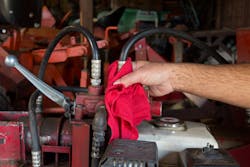Are reusable shop towels dangerous to workers?
Fleet and shop employees need the best tools for the job, and they need the tools to be safe, compliant and economical. This applies to shop towels, just as it does to auto parts and solvents.
However, information within the industry on the safety, cost, compliance and environmental impact of shop towels – in particular reusable, cloth shop towels – is muddled at best.
Safety
An oft-cited study, published in 2003 and updated in 2011, used disputed data and references to assert clean, reusable shop towels, when properly laundered, expose users to trace metals creating a health risk. This flawed study has been used for more than a decade to unjustly raise concerns that shop towels might contain concentrations of metals in excess of acceptable toxicity levels established by regulation.
In response to these ongoing concerns, an independent study was completed in early 2014 by Arcadis US – a global natural and built asset design and consultancy firm – and then published in October 2014 in The Journal of Regulatory Toxicology and Pharmacology – a peer-reviewed science journal. The study evaluated 27 heavy metals across a range of exposure pathways (e.g., towel-to-hand) and sampled laundered shop towels from 10 laundering facilities across the United States.
The resulting data determined reusable shop towels do not pose any health risk to workers.
The study was also analyzed by an industrial hygienist from Johns Hopkins University who confirmed that properly laundered shop towels do not pose a health risk to workers. Specifically, the study found the highest hazard indices for the metals examined in this study were at least 10 times lower than the regulatory level of concern and posed no risk to worker health.
Additionally, there are currently no human health studies that prove anyone is at risk or has ever been sickened by laundered shop towels.
“Billions of shop towels have been used by countless employees for more than 100 years across a range of automotive, manufacturing and other industries the world over,” notes Douglas Waldman, president of Superior Linen and chairman of TRSA. “With that kind of history and usage, certainly by now, there would be ample evidence of workers harmed by shop towel use.
“The reality is no such evidence exists because laundered shop towels are not a threat to workers.”
Economy
Critics of reusable shop towels also argue the towels are more expensive than their disposable counterparts. Yet, a single reusable shop towel is 83 percent less costly than a disposable when it handles 10 light-soil wiping tasks before washing.
As wiping tasks increase in severity, reusable shop towels are less costly than their disposable counterparts.
What’s more, disposables create additional waste and transport costs, as well as compliance requirements. On average, businesses spend nearly $3 per roll just in waste disposal fees for disposable shop towels. This cash outlay disappears along with the associated costs of custodial labor, trash bags and more when reusables are substituted.
Opportunities to rent reusable shop towels from industrial laundries for a shop’s operational needs remain an economical choice. The cost and burden to replace these when they reach the end of their useful life is borne by the commercial laundry, so it is not an upfront cost to the fleet or shop operation.
Environment
For those shops looking for a more eco-friendly option, disposables fail this test based on their intended purpose. Under the Code of Federal Regulations, 40 CFR 261.3 (A), 261.2 (C) and 261.3 9D, many disposable shop towels used in industrial settings become classified as hazardous waste and incur compliance costs for the shop using them, including disposal in appropriate landfills.
Under the federal rule, a disposed single-use towel is considered hazardous when it contains soils in detectable volumes such as:
- F-list (non-specific source) wastes from common industrial processes, including many solvents.
- K-list (source-specific) wastes from certain industrial processes, including wood preservation organic chemical production and pesticide manufacturing.
- P-list and U-list (discarded commercial chemical products).
Under 40 CFR 261.3 (A) and section 402 of the Clean Water Act, industrial laundries comply with the disposal of shop towel soils under their discharge permits from their local publicly-owned treatment works. As such, they are not classified as hazardous waste.
However, the true environmental impact of reusable and disposable shop towels is not simply assessed at disposal. A full life cycle assessment illuminates the total environmental impact.
In 2013, TRSA study commissioned a lifecycle analysis comparing selected reusable textiles against alternative disposable products, and specifically examining shop towels.
After exhaustive research across a range of common U.S. emissions impacts, including raw materials, production processes and shop towel use and disposal, the study found reusable shop towels or wipes have a significantly lower environmental impact than disposables in the majority of cases.
The study was conducted by Exponent – an engineering and scientific consulting company – and PE International – a sustainability consulting services company.
Reality
When safety, economy and environmental impact of reusable or disposable shop towels are measured in the operation of any fleet or automotive shop, reusable shop towels provide advantages.
Reusable shop towels were a go-to resource in the early days of the industrial revolution, and definitive scientific studies attest they remain the safe, affordable and environmentally viable resource today.
Joseph Ricci is president and chief executive officer of TRSA (www.trsa.org), an international organization representing companies that supply reusable laundered garments, uniforms, linens, mats, towels and other products necessary for businesses to operate safe, clean facilities, serve their customers and provide a clean, attractive environment and image. TRSA works closely with members and federal agencies to improve employee safety and to develop a sustainable reusable textile services industry by reducing its use of energy and natural resources.
